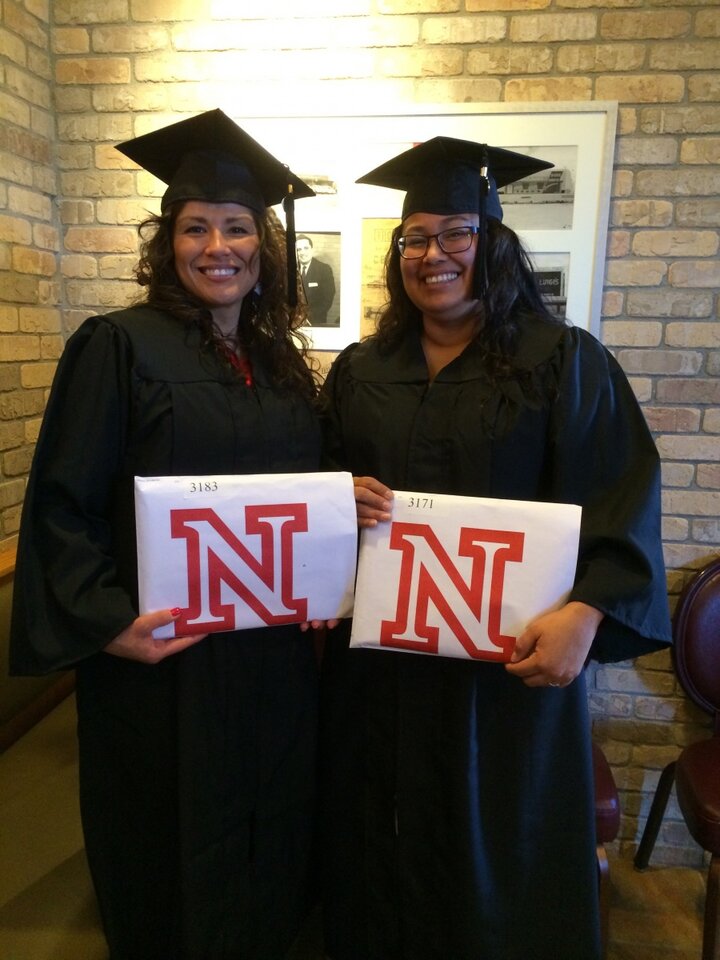
The University of Nebraska-Lincoln (UNL) College of Education and Human Sciences and its consortium partners Little Priest Tribal College and the Nebraska Department of Education have been awarded a four-year grant from the U.S. Department of Education, Office of Indian Education. The Indigenous Roots Teacher Education Program (ROOTS) prepares American Indian paraprofessionals to become certified elementary education and bilingual teachers employed in Nebraska's reservation schools. The ROOTS program directly addresses Absolute Priority One - Pre-service Training for Teachers - and Competitive Preference Priority One in the U.S. Department of Education’s Office of Indian Education, Professional Development grants.
ROOTS is a four-year program that builds on the success of two previous federally funded programs; The Native American Career Ladder program, funded in 1999 through the Office for English Language Acquisition and the 2005 Indigenous Roots Teacher Education Program. As a result of these two federal grants 30 students have graduated and are working in educational settings throughout Nebraska, South Dakota, North Dakota and Iowa.
The new ROOTS program recruits and trains a cohort of American Indian students living in or near Santee, Winnebago, Walthill, and Macy communities in Northeastern Nebraska to become teachers certified in Elementary Education (K-8) and ESL (K-12). After graduation, it is expected that these new teachers return to their home communities to work as teachers. This program significantly impacts K-12 students attending Santee Community School, Winnebago Public School, Walthill Public School, and the Omaha Nation School by placing teachers with similar backgrounds into these educational settings, and by providing professional development experiences for the ten pre-service students working in the four target school districts, thereby improving educational outcomes for typically at-risk students. The overall outcome of ROOTS will be stronger educational programs for American Indian students in the target communities and greater academic success for American Indian students overall.
Ten students will be selected to participate in the new 2011 ROOTS UNDERGRADUATE program. Students applying for the program will be recommended by Little Priest Tribal College, Nebraska Indian Community College, area school districts and/or local education institutions, and community members. Program participants enter the program with an A.A., A.S., or a post-baccalaureate degree. Training is offered at Little Priest Tribal College, Nebraska Indian Community College and at each participating school, utilizing distance and on-line services available through the University of Nebraska-Lincoln. Students will be required to enroll at courses offered through LPTC or NICC in order to fulfill general education, pre-education, language, English, Math or PPST/other testing requirements. It is anticipated that at least ten students will be certified as elementary education teachers.
Qualified staff will supervise students' practicum and student teaching semesters to ensure quality program implementation and cultural relevance, as well as induction services. Participants will develop and implement culturally relevant and bilingual K-12 learning materials and curriculum related to Omaha, Winnebago, and Santee Sioux history, culture and language. As part of the ESL endorsement students will take coursework in Umonhon, Ho-Chunk, and Dakota languages. Resources will be available ensure that participants, cooperating teachers, and others have access to culturally relevant materials.
ROOTS student services include academic advising and on-site coordinators for the pre-service students (Years 1-3) and first year teachers (Induction Year 4). Incentives include monthly stipends and up to 20 hours/week employment in participating schools. Students who have been selected to participate will sign a pay-back agreement, should they not complete the program (for any reason), they will be required to pay back the full cost of their education to the U.S. Department of Education.
ROOTS is a consortium program that includes several partners - UNL's College of Education and Human Sciences, Little Priest Tribal College (LPTC), and the Nebraska Department of Education.
The ROOTS program contributes to overall cultural change in Nebraska in several ways. The ROOTS program leads to the creation of stronger educational programs for K-12 students in targeted communities and greater academic success for American Indian students overall. Program staff will network with an existing state resources (the Nebraska Department of Education, the Nebraska Commission on Indian Affairs) to share learning experiences and develop strategies to facilitate ongoing opportunities for American Indian students to participate in Nebraska’s teacher preparation programs.
About the title, INDIGENOUS ROOTS TEACHER EDUCATION PROGRAM:
Overlooking the Missouri River in northeast Nebraska are the Santee, Winnebago, and Omaha Indian Reservations. The title and metaphor for this project are inspired by this dramatic landscape. Prior to European settlement, these bluffs were swept by fire, droughts and blizzards, but the ecosystem was resilient because of its native prairie grasses and scattered bur oaks. The key to survival for these plants was the extensive root system, which makes up over 90 percent of living prairie grass. Fires may kill the aboveground stem of a bur oak a hundred times, but the tree persists and regenerates from its ancient roots. A few pockets of these native ecosystems persist in Nebraska, and efforts are being made to restore them. The starting point for any effort to conserve and restore this landscape, however, must be its indigenous roots. To rebuild an enduring, resilient root system requires patience, hard work, and a deep understanding of native grasses and oaks. A resilient, productive K-12 education system for native people in northeast Nebraska reservation communities requires no less.